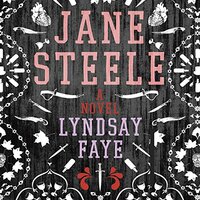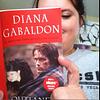Take a photo of a barcode or cover
"Reader, I murdered him."
About damn time.
Listen. I don't like the Bronte sisters. HATED Wuthering Heights. Can sort of stand Jane Eyre. Saw this tag line and thought "ok, I'm intrigued." Read the synopsis and was in. Jane with some gumption? Sweet.
It took me a bit to get into the book. The first half was a bit slow for me, but maybe that was kid interruptions. I listened to the last half today and it was much more interesting. I wouldn't say its something I would come back to time and again, but again, I don't love the source material. But I do love how it *changed* the source material.
Murdery, funny at times, a bit of mystery to solve. Pretty good all around.
About damn time.
Listen. I don't like the Bronte sisters. HATED Wuthering Heights. Can sort of stand Jane Eyre. Saw this tag line and thought "ok, I'm intrigued." Read the synopsis and was in. Jane with some gumption? Sweet.
It took me a bit to get into the book. The first half was a bit slow for me, but maybe that was kid interruptions. I listened to the last half today and it was much more interesting. I wouldn't say its something I would come back to time and again, but again, I don't love the source material. But I do love how it *changed* the source material.
Murdery, funny at times, a bit of mystery to solve. Pretty good all around.
This book is really cool and a new take on Jane Eyre. So creative and interesting.
"It would be inaccurate to say my heart skipped- nothing whatsoever happened to that poor excuse for an organ"
This review has turned out rather scholarly, perhaps because of its connections to Jane Eyre, which I've read multiple times, as a student and as a teacher. I want to preface the rest of my review by saying that I LOVED this novel. I was completely immersed in the narrative and adore the character of Jane Steele. Faye's approach to historical fiction reminds me a bit of [a:Sarah Waters|25334|Sarah Waters|https://d.gr-assets.com/authors/1409248454p2/25334.jpg]. It's so good, you should totally read it, & here's, like, a few gifs to offset the rest of my review.



In her "Historical Afterward," Faye writes, "Finally, it would be rather disingenuous of me to suggest that this book isn't rather ridiculous, and be it known that its ridiculousness is based in both truth and in fiction." In her acknowledgements, she thanks "Charlotte Bronte and Charles Dickens, as well as..Sir Arthur Conan Doyle and Daphne du Maurier, whose smudgy literary fingerprints are likewise all over this volume."
The publisher's description of this book as "a reimagining of Jane Eyre as a gutsy, heroic serial killer," is overly simplified and somewhat misleading. I suppose by the most lax definition of "serial killer," Jane Steele is one, having killed more than two or three in total, but she doesn't get sexual or psychological gratification from the killing. The gutsy & heroic parts are pretty spot-on, though. And Steele does not merely take the place of Eyre. Although there are many parallels in their stories, Steele is her own woman entirely, with a number of differences in her circumstances as well as her responses. She actually discovers Bronte's novel partway through her tale and enjoys reading it several times. Each chapter of the novel (written as Steele's memoir) begins with a brief excerpt from Jane Eyre.
And what a memoir it is. Written in Victorian style with decidedly modern, feminist sensibilities, Jane Steele has one hell of a life story to tell. Due to the style, the plot unravels slowly at times, but I found the slow burn to be enjoyable rather than boring. Steele is a delicious combination of intelligence and sass, doing her best to survive in an era when women had very little power or independence. She can blend in at either end of the social/economic spectrum, although she feels out of place in both.
When Jane returns to her childhood home in the guise of a governess, she encounters a house full of survivors of the Sikh Wars, of which I knew next to nothing before reading this book. Faye has done extensive research and skillfully blends that into the tale.



In her "Historical Afterward," Faye writes, "Finally, it would be rather disingenuous of me to suggest that this book isn't rather ridiculous, and be it known that its ridiculousness is based in both truth and in fiction." In her acknowledgements, she thanks "Charlotte Bronte and Charles Dickens, as well as..Sir Arthur Conan Doyle and Daphne du Maurier, whose smudgy literary fingerprints are likewise all over this volume."
The publisher's description of this book as "a reimagining of Jane Eyre as a gutsy, heroic serial killer," is overly simplified and somewhat misleading. I suppose by the most lax definition of "serial killer," Jane Steele is one, having killed more than two or three in total, but she doesn't get sexual or psychological gratification from the killing. The gutsy & heroic parts are pretty spot-on, though. And Steele does not merely take the place of Eyre. Although there are many parallels in their stories, Steele is her own woman entirely, with a number of differences in her circumstances as well as her responses. She actually discovers Bronte's novel partway through her tale and enjoys reading it several times. Each chapter of the novel (written as Steele's memoir) begins with a brief excerpt from Jane Eyre.
And what a memoir it is. Written in Victorian style with decidedly modern, feminist sensibilities, Jane Steele has one hell of a life story to tell. Due to the style, the plot unravels slowly at times, but I found the slow burn to be enjoyable rather than boring. Steele is a delicious combination of intelligence and sass, doing her best to survive in an era when women had very little power or independence. She can blend in at either end of the social/economic spectrum, although she feels out of place in both.
When Jane returns to her childhood home in the guise of a governess, she encounters a house full of survivors of the Sikh Wars, of which I knew next to nothing before reading this book. Faye has done extensive research and skillfully blends that into the tale.
A reimagining of the classic "Jane Eyre" in which our protagonist is a serial killer who has used the base text as a crutch to relate her life to. Sounds a bit meta? It's more awesome than you think even though the first few pages threw me off at first. Bronte's original is one of my favorites and this one is also getting added to the favorites shelf because not only does it pay homage to the original, it stands on its own in many ways.
Reader, go read this book. Now.
Reader, go read this book. Now.
I loved this book, it was hilarious and fast paced but also did not itself too seriously. Even though it had the tones of a satire I felt as if the reader was behind Jane the whole time and supported her even when she was making the most unnecessarily wild decisions
missed opportunity for an amazing friend-to-lover sapphic romance but w.e.
I hope that the epitaph of the human race when the world ends will be: Here perished a species which lived to tell stories.
Jane Steele was just fun. Flat out fun. Well-written and exciting fun. This book and I had a great time. I admit to never having read [b:Jane Eyre|10210|Jane Eyre|Charlotte Brontë|https://d.gr-assets.com/books/1327867269s/10210.jpg|2977639]. I own that decision. I am not a fan of gothic tales (of which that may arguably be the best) and I grew up watching a televised version of it at my best friend's house, so I know where the story goes, at least. So, it remains on my to-read list.
In Jane Steele, Faye has created a character (the titular one) with harmony of disposition and strength and action and wherewithal. The tone of the book felt a lot like [b:Vanity Fair|5797|Vanity Fair|William Makepeace Thackeray|https://d.gr-assets.com/books/1344386439s/5797.jpg|1057468]'s Becky, or the backstory for the reincarnated character, Lady Melinda Winifred Waine Tentrees, a seductive 18th century coquette who was born the illegitimate daughter of a kitchen maid in Minnelli's 1970 film, On a Clear Day You Can See Forever. It was a lovely balance of being both playful and flirty, and straightforward and sensible. I look forward to reading other works by Faye.
We tell stories to strangers to ingratiate ourselves, stories to lovers to better adhere us skin to skin, stories in our heads to banish the demons. When we tell the truth, often we are callous; when we tell lies, often we are kind. Through it all we tell stories, and we own an uncanny knack for the task.
I bought this book because I was told it was a modern retelling of Jane Eyre; when it arrived in the mail and I realized that it is not a modern Jane Eyre, I put it aside for a year or so. However, I finally did read it, and it is delightful. Jane Steele is a contemporary of Jane Eyre’s, and she is enamored with the book—she references and quotes it often. But Jane Steele is no Jane Eyre! She is feisty and irreverent and independent in ways Jane Eyre would never imagine! This is such a fun read, as it deals with delicate themes very delicately. It’s a great story and keeps you guessing and laughing all the way through. Ridiculous in all the right ways.
My Recommendation: I thought it was a great read! If you like the Brontës or even just that time period, I would recommend it. Faye’s writing is excellent and I often found myself shocked she included such modern ideas (LGBT characters, diverse religions/ethnicity and strong female characters) and then I had to remind myself this was NOT written in the early 1900s but in the 2010s. Clearly Faye did a great job of seamlessly weaving in these ideas using the language and references of the time.
My Response: This was incredibly entertaining and fascinatingly fun to read, but it wasn’t at all what I expected. I think perhaps I’ve read too many Austen fan-fiction novels that fit into one of two molds: modern retelling or prequel/sequel. There are the occasional paranormal/sci-fi mash-ups but mostly they fit within those first two molds. This novel was completely different.
I knew it would be different because the Brontë’s are such different writers, but I wasn’t aware how different it would be in terms of fan-fiction. I’ve only read a few Brontë fan-fiction works, 50% or more of which made me want better stories or better writing. When I reached out to the publisher, G.P. Putnam’s Sons, for a review copy I didn’t quite know what I was getting into, but I’m definitely glad I requested it!*
Continue reading on my book blog at geoffwhaley.com.
*I received a copy of this book in return for an honest response. No goods or money were exchanged.
My Response: This was incredibly entertaining and fascinatingly fun to read, but it wasn’t at all what I expected. I think perhaps I’ve read too many Austen fan-fiction novels that fit into one of two molds: modern retelling or prequel/sequel. There are the occasional paranormal/sci-fi mash-ups but mostly they fit within those first two molds. This novel was completely different.
I knew it would be different because the Brontë’s are such different writers, but I wasn’t aware how different it would be in terms of fan-fiction. I’ve only read a few Brontë fan-fiction works, 50% or more of which made me want better stories or better writing. When I reached out to the publisher, G.P. Putnam’s Sons, for a review copy I didn’t quite know what I was getting into, but I’m definitely glad I requested it!*
Continue reading on my book blog at geoffwhaley.com.
*I received a copy of this book in return for an honest response. No goods or money were exchanged.






